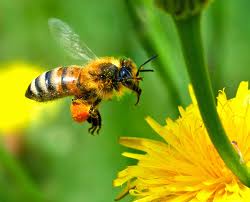Bee Aware

September is Bee Aware Month, a campaign to educate New Zealanders about the humble, often overlooked, honey bee. Horsham Downs beekeeper Stephanie Lynch has put together a little plea for the bee.
“When the flower blooms, the bees come uninvited” – Ramakrishna
Bees are critically important. Without them, our gardens would be without many of their plants and flowers, and our major agri-export industries would be in severe trouble and two-thirds of our food would disappear.
Honey bee colonies are dying or disappearing in record numbers in the US. Thriving colonies disappear overnight, the bees fly off never to return, leaving the queen bee and mother of the hive to starve to death.
Things aren’t quite so bad in New Zealand, yet, but our bees are increasingly threatened with the long-term effects of varroa mite and other new diseases. Added to this is the misuse of pesticides that affect bees in gardens and on farms, the loss of habitat for shelter and the lack of flowers for bee food.
Here’s what we can do to help our bees survive:
· Go organic or at least limit pesticides in our gardens. If you struggle with that idea then look for bee-friendly sprays and use them at dusk when the bees are back in their hives.
· Grow plants in your garden that attract bees. Bees love plants with ample amounts of pollen and nectar such as lavender, rosemary, calendula and forget-me-not . Bees are attracted to these colours: yellow, blue-green, blue and ultraviolet flowers. You can purchase wildflower bee friendly seeds here. All the money from these seed sales go to the National Beekeepers Association to help NZ bees. Also check out the Urban Trees for Bees pamphlet for planting suggestions.
· Create a shallow pond in your garden where bees can land on the edges to collect water.
· Don’t mow the lawn too often, leave clover and dandelion in the lawn for a while for bees to forage on.
· Eat more organic food to encourage producers to limit pesticides on crops.
· If you come across a swarm of bees please don’t call the exterminators but instead call your local beekeeping club. The National Beekeeping Association has contact numbers on their website. Having said this you do want to destroy wasp nests as they rob beehive stores. You can pour petrol on their nests or contact a terminator.
· Find out more about the honey you are eating and make sure it is from beekeepers who care about their bee’s health and not just about production.
· Spread the word by letting people know this information and support any petitions or change in policy that further protects our bees.

In other bee news – congratulations are in order to Stephanie and Martin, all four products entered into this year’s National Beekeepers Association honey competition got placings.
They won Gold for their Bee Pollen, Silver for Ohui Manuka 10+ and bronze for Hakarimata honey and the Propolis Tincture.
Well done guys!
Information was sourced from The National Beekeepers Association and The Telegraph.


Bee aware indeed – honey is precious (it took my old friend Dudley Lorimer to a handful of days short of a century) but our tables owe these wee flying friends much more than this sweet spread. That excellent article says it all!
Fabulous news and handy tips. My husband and I were talking this weekend about helping out in some way and thought about leasing out part of our small property for bee hives. I now know who to ring.
Glad it was of help, Brenda!